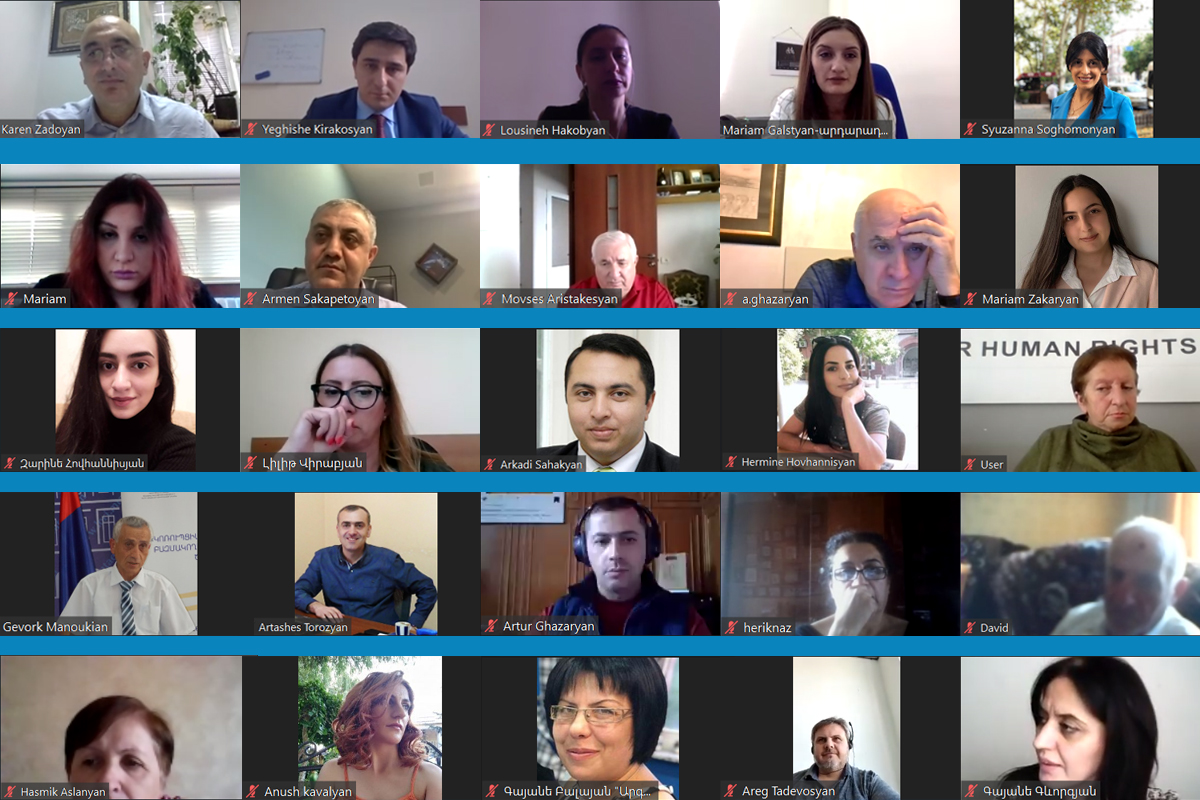Public Discussion of the Concept on Constitutional Anti-Corruption Body/Bodies was held

On 24 September, a discussion of the Concept on Constitutional Anti-Corruption Body/Bodies, was held on the on-line platform. The discussion was organized jointly by the Professional Committee on Constitutional Reforms, the Armenian Lawyers’ Association, CSO Anti-Corruption Coalition of Armenia and the Armenian National Platform of the Eastern Partnership Civil Society Forum.
About 70 participants, lawyers, representatives of civil society organizations and state bodies took part in the discussion.
In his welcoming speech, Mr. Yeghishe Kirakosyan, Chairman of the Professional Committee on Constitutional Reforms, mentioned that this public discussion is more specialized than the previous two discussions, which will allow collecting the best necessary views. “We have not yet discussed the conceptual provisions related to the anti-corruption body, they will be included in the agenda and discussed during one of the upcoming sittings,” he said, adding that the draft concept is being finalized now.
“For us, the independence of the body, functional, financial and institutional independence is important. We will spare no effort to ensure the independence of the employees there, the guarantees of their activity, why not give them an opportunity to make reforms, to completely review the investigation of corruption crimes,” Ms Mariam Galstyan, Head of the Anti-Corruption Policy Development Department of the RA Ministry of Justice said.
Ms Lousine Hakobyan, Coordinator of the Armenian National Platform of the EaP Civil Society Forum, President of “Europe in Law Association” NGO said, “Prevention of corruption and effective fight against corruption are among the most important commitments made by the people of the post-revolutionary government. This is enshrined both in the government’s program and in international agreements.
Anti-corruption expert Ms Mariam Zadoyan presented the international experience on anti-corruption bodies to the participants of the discussion. “Anti-corruption bodies are mainly classified into 3 types: the universal, multifunctional anti-corruption body. In the case of this model, there is one anti-corruption body, which is endowed with all the functions of anti-corruption – law enforcement, preventive and educational; this model is available in Hong Kong, Lithuania, Latvia, Poland and other countries. In the case of a separated model, as a rule, there are two separate anti-corruption bodies, one of which deals with anti-corruption law enforcement activities, and the other with preventive-educational functions; this model operates in the Ukraine and Romania. In the case of a decentralized model, as a rule, there are numerous anti-corruption law enforcement and preventive units within other bodies; this model has been adopted by the United States, Great Britain and other countries,” the expert said.
Anti-corruption expert Ms Syuzanna Soghomonyan presented the stages of the fight against corruption in the Republic of Armenia and the results obtained in them. According to her, it can be conditionally divided into 3 stages. “Decentralized phase of the fight against corruption (2003-2015), preliminary stage of transition to the separated model in the fight against corruption in pre-revolutionary Armenia (2016-2017), final stage of transition to the separated model in the fight against corruption in post-revolutionary Armenia (2018 to present)”.
Mr. Karen Zadoyan, President of the Armenian Lawyers’ Association, presented the conceptual provisions; spoke about the constitutional vision of the Armenian model of anti-corruption struggle. He stressed the fact that the guarantees of the independence of the anti-corruption body should be enshrined in the Constitution, so that in the future it would not be easy to change it in parallel with the change of the political will of the current government.
Karen Zadoyan also spoke about the constitutional standards of the anti-corruption body/bodies: standard of definition of functions, standard of election by the National Assembly through competitive procedure, standard of exhaustive enumeration of grounds for termination of powers, standard of apolitical stance, standard of proper financing, standard of immunity, standard of terms, etc. “The people who will work in the anti-corruption commission or committee or in a universal body should be apolitical. No one should have the opportunity to make appointments based on political expediency, such as the impression, for example, in the case of the elections of the Corruption Prevention Commission,” Karen Zadoyan said.
The participants of the discussion largely agreed that the anti-corruption body/bodies should receive a constitutional status and high guarantees of independence.
Mr. Arsen Ghazaryan, President of the Union of Manufacturers and Businessmen of Armenia, noted, “The body must get a constitutional formulation; this is definitely a necessity, especially today, after the revolution. We need a constitutional formulation, which first of all will give independence, will give guarantees of absolute independence, will give a system of personnel selection, developed by the Constitution.”
Notably, the results of the discussion, the opinions and suggestions voiced will be summarized and will be presented to the Professional Committee on Constitutional Reforms.
